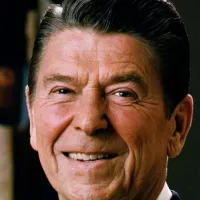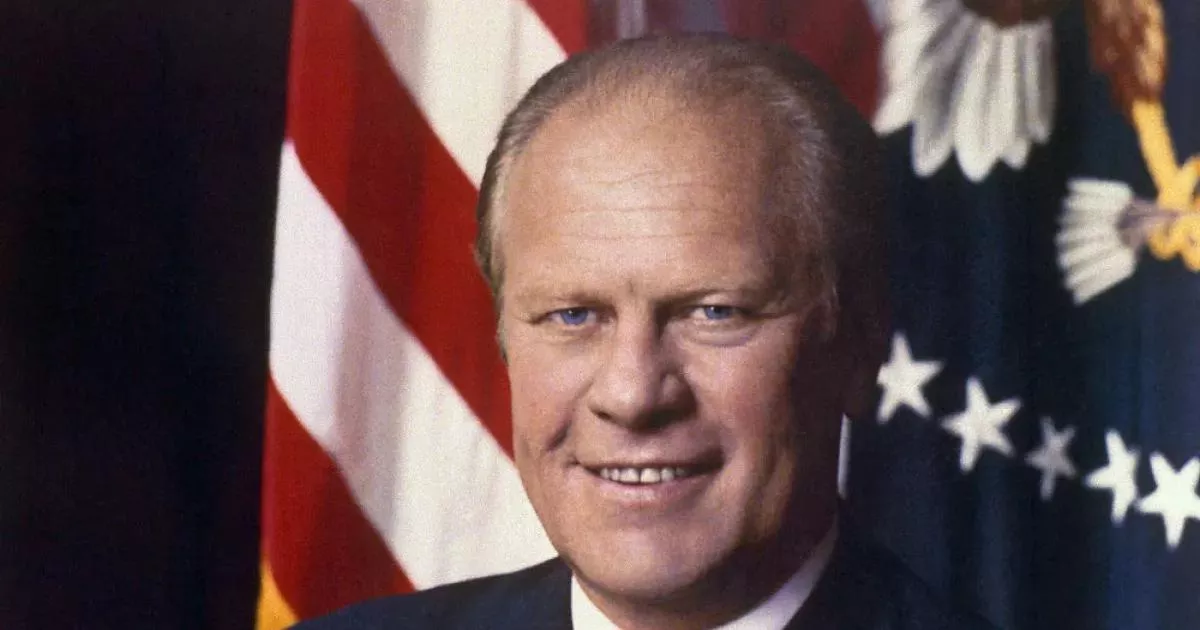Public opinion and media debates around Gerald Ford—discover key moments of controversy.
Gerald Ford, the 38th U.S. President, served from 1974-1977. A Republican, he ascended to the presidency after Richard Nixon's resignation, having previously served as Nixon's Vice President following Spiro Agnew's resignation. Before becoming Vice President, Ford was a member of the U.S. House of Representatives from 1949 to 1973. His presidency was largely defined by his controversial pardon of Nixon and efforts to combat inflation during an economic downturn.
1939: Ford Signed Petition to Enforce Neutrality Act
In 1939, Gerald Ford joined a group of students and signed a petition to enforce the 1939 Neutrality Act, inspiring the America First Committee.
September 8, 1974: Pardon of Richard Nixon
On September 8, 1974, Ford issued Proclamation 4311, granting Richard Nixon a full and unconditional pardon for any crimes he might have committed against the United States while president.
October 1974: Launch of "Whip Inflation Now" (WIN) Campaign
In October 1974, President Ford initiated the "Whip Inflation Now" (WIN) campaign to combat rising inflation by urging Americans to reduce spending and consumption. The campaign included asking people to wear "WIN" buttons and proposing a one-year, five-percent income tax increase on corporations and wealthy individuals.
October 17, 1974: Testimony Before Congress on Nixon Pardon
On October 17, 1974, Gerald Ford testified before Congress regarding his pardon of Richard Nixon, becoming the first sitting president since Abraham Lincoln to do so.
1974: Reluctance to Mention Nixon's Name
In 1974, in the months following the pardon of Richard Nixon, Ford often declined to mention Nixon by name, referring to him instead as "my predecessor" or "the former president."
March 1975: Ford Frustrated with Israeli Tactics
In early March 1975, during Kissinger's shuttle diplomacy in Israel, Ford expressed frustration with what he considered Israel's "stalling" tactics in negotiations related to the Arab-Israeli conflict.
March 1975: Reassessment of Middle East Policies
On March 24, 1975, Ford informed congressional leaders of the reassessment of the administration's policies in the Middle East, leading to the suspension of further aid to Israel.
May 1975: Mayaguez Incident
In May 1975, shortly after the fall of Saigon and the Khmer Rouge conquest of Cambodia, Cambodians seized the American merchant ship Mayaguez in international waters. Ford dispatched Marines to rescue the crew, but the Marines landed on the wrong island and met unexpectedly stiff resistance just as, unknown to the U.S., the Mayaguez sailors were being released. Two military transport helicopters carrying the Marines were shot down, resulting in 41 U.S. servicemen killed and 50 wounded. Despite the American losses, the operation was considered a success in the United States.
August 1975: Betty Ford's Interview on Abortion
In August 1975, First Lady Betty Ford stated during an interview for 60 Minutes that Roe v. Wade was a "great, great decision", contrasting with President Ford's stance.
November 1975: Adoption of National Security Study Memorandum 200
In November 1975, Ford adopted the global human population control recommendations outlined in National Security Study Memorandum 200 as United States policy, aiming to protect American economic and military interests.
1975: Ford Declines to Bail Out New York City
In 1975, President Ford refused to provide federal support to bail out New York City from bankruptcy, leading to the New York Daily News' "Ford to City: Drop Dead" headline.
December 1976: Cancellation of Swine Flu Vaccination Program
In December 1976, the swine flu vaccination program, plagued by delays and public relations issues, was cancelled after vaccinating approximately 25% of the U.S. population.
2008: Release of FBI Memo
In 2008, an FBI memo was released to the public, revealing that Ford was in contact with the FBI during his time on the Warren Commission in 1963 and relayed information to the deputy director, Cartha DeLoach, about the panel's activities.
Mentioned in this timeline

John F Kennedy JFK was the th U S President...

Elizabeth II reigned as Queen of the United Kingdom and...

Ronald Reagan the th U S President - was a...
The United States of America is a federal republic located...

The White House located at Pennsylvania Avenue NW in Washington...
California is a U S state on the Pacific Coast...
Trending

2 hours ago Marcus Smart shines with defensive prowess, racking up steals in Lakers' victory.

2 hours ago DeMar DeRozan Trade Rumors: Kings, Hawks Potential Suitors; NBA Picks Targeted

2 hours ago Devin Booker returns from injury as Haywood Highsmith debuts for Suns.

2 hours ago Maxime Raynaud Shines Despite Loss; Praised for Rookie Potential and Shooting.

2 hours ago Rui Hachimura's demand for Lakers' focus surfaces after victories over Warriors and Kings.

2 hours ago Zion Williamson's Status: Lakers Game, Ankle Injury, and Recent Playing Streak
Popular

Hillary Diane Rodham Clinton is a prominent American politician lawyer...

Ken Paxton is an American politician and lawyer serving as...

Jesse Jackson is an American civil rights activist politician and...

Jim Carrey is a Canadian-American actor and comedian celebrated for...

Bill Clinton served as the nd U S President from...

XXXTentacion born Jahseh Dwayne Ricardo Onfroy was a controversial yet...
